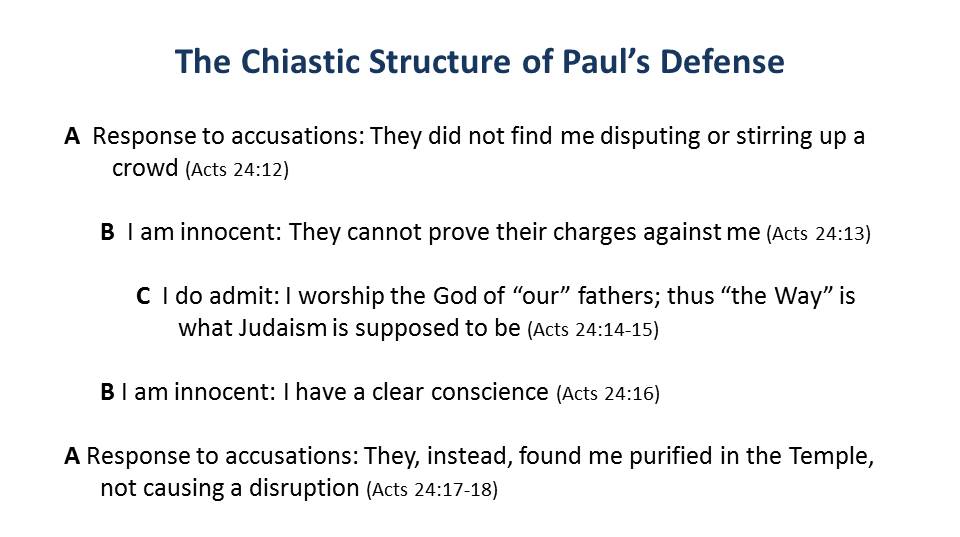 Lysias, the tribune (chiliarchos, commander of a 1,000), had arrested Paul because of the ruckus surrounding him with the Jews. At first, he tried to get the Sanhedrin to settle the matter with Paul. After all, as far he could tell, the row was over religious matters, of which he knew little and would have preferred avoiding.
Lysias, the tribune (chiliarchos, commander of a 1,000), had arrested Paul because of the ruckus surrounding him with the Jews. At first, he tried to get the Sanhedrin to settle the matter with Paul. After all, as far he could tell, the row was over religious matters, of which he knew little and would have preferred avoiding.
But after hearing of a murder plot on Paul’s life, the tribune chooses to have Paul dealt with within the Roman legal system, especially since he was a Roman citizen. The tribune assembled 200 soldiers and 70 cavalrymen to escort Paul to Caesarea, starting about 9:00 PM. This was, no doubt, to whisk Paul away after dark, when there would be little chance of a crowd causing a disturbance.
We now hear the main gist of what that tribune wrote to Governor Felix, explaining why Paul was sent his way.
Paul before Governor Felix
Read Acts 23:25-30
- Whom will the tribune also send to the governor?
- What is the tribune trying to ensure?
Note: The tribune, although trying to be fair, does not mention his own blunders. He is silent about not learning of Paul’s citizenship when he rescued him from the angry crowd (23:27), but only when he was about to have him scourged, which was against Roman law (22:24-29).
Read Acts 23:31-35
Antipatris: A town about 40 miles north of Jerusalem, which had a military garrison. It was halfway between Jerusalem and Caesarea.
Herod’s Praetorium: A palace and fortress that Herod the Great had built decades earlier. Roman governors were now using the praetorium as their official residence.
- Why would the soldiers return to Jerusalem after arriving at Antipatris?
Paul Stands Trial before Felix
Read Acts 24:1-2a
Tertullus: A name derived from the Latin word for three (tertius). We know little of him. To describe him, Luke used the Greek word, rheter, which is the only place where it appears in the New Testament. It can simply mean “speaker” but, here, in this context, it also carries with it the meaning of “lawyer.” Acting as speaker and lawyer, the Jewish leadership enlists his help as a prosecuting attorney on their behalf.
- Discuss: Why would the Sanhedrin choose to have someone else speak on their behalf?
Read Acts 24:2b-9
- How does Tertullus shape his words to Felix against Paul?
- To achieve his end, how does Tertullus try to separate Christianity from the “real Judaism.”
Note: At that time, the Romans still considered Christianity to be a subgroup of Judaism; thus, it was still a “legal” religion.
Paul Defends Himself
Read Acts 24:10-16
- When Paul begins to speak, what does he not do that Tertullus had done?
- How does Paul address his case understanding how Roman law functioned?
- How does Paul describe Christianity, understanding that Judaism is a legal religion?
Read Acts 24:17-21
Paul makes two statements. First, he said that the Jews from Asia Minor should testify, since they were the first to accuse him in the Temple. Second, he brings up the religious doctrine about the resurrection of the dead, which the High Priest, Ananias, saw a heresy.
- What was Paul doing when he put those two facts before Felix?
- What do you think Paul was trying to achieve?
- Through Paul’s use of chiasm, what was his main point?
Paul and Felix
Read Acts 24:22-23
- What do we learn about Lysias?
- Whom does Felix want to testify before him?
- How is Paul treated?
Read Acts 24:24-25
- What do learn about Felix why he knew so much about “the Way”?
In verse 25 (remember Luke, the writer was a well-educated Gentile convert to Christianity), Luke wrote that Paul “reasoned about righteousness and self-control and the coming judgment.” Luke was describing the topics of conversation in categories of Greek moral philosophy. This was simply one way that Luke made the content of Acts more relatable to Gentile readers/hearers.
- Why would Felix be “alarmed” by what Paul said?
Read Acts 24:26
- What did Felix want from Paul?
The New Governor, Porcius Festus
We now learn that Paul had been imprisoned for two years! It’s then that a new governor succeeds Felix, Porcius Festus.
Read Acts 24:27-25:5
- How is Porcius trying to keep the Jews happy while still honoring Roman law?
Read Acts 25:6-8
- Like before, what is the outcome of this trial?
Read Acts 25:10-12
- What does Porcius offer to Paul?
- Name two reasons why Paul wouldn’t want to be tried again by the Sanhedrin? (Acts 23:11-12)
- What does Paul request as a Roman citizen?
- Why do you think it was in Porcius’ best interest to grant Paul’s request?
To be continued after Easter.
Click here to go to the next Lesson.


